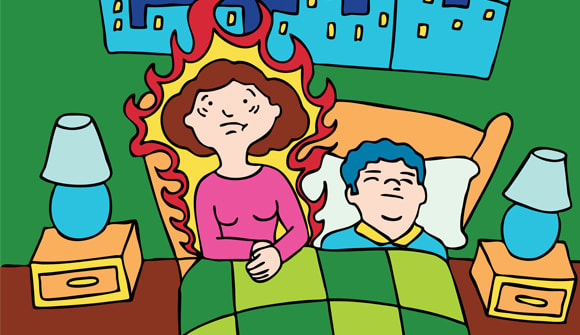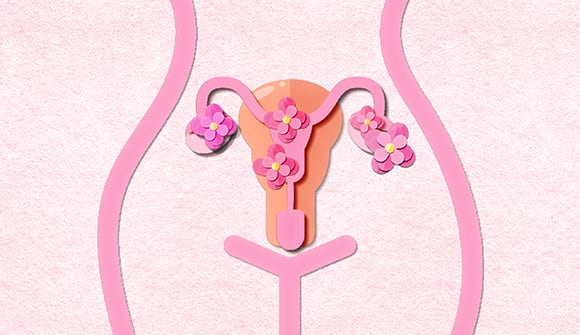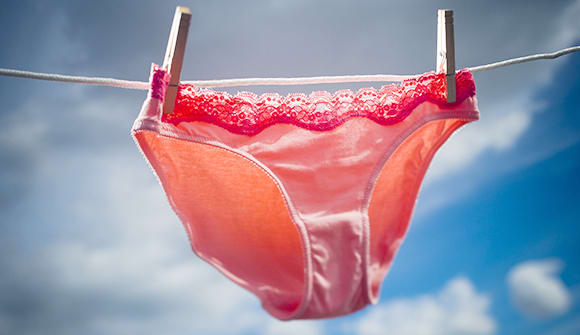Menopause myths
Don’t suffer with your symptoms.
Article Date:

Birthday cards for women over 50 are rife with jokes about menopause. But for many women experiencing its symptoms, it is anything but funny. While most women are glad to say goodbye to periods, the hot flashes, irritability and sleep disturbances that may come with menopause can affect the quality of life.
So, how do you know if you have officially reached menopause? Menopause is just what it sounds like – a pause in “menses,” or menstruation. It’s diagnosed after a woman has gone 12 months without a period. It usually happens in your 40s or 50s, with the average age being 51.
Most common symptoms include:
- Hot flashes
- Night sweats
- Vaginal dryness
- Mood changes or irritability
- Sexual issues
Gynecologic surgeons Mary Ellen Wechter, MD, and Paulami Guha, MD, with North Florida Gynecology Specialists at Baptist Medical Center Jacksonville helped shed light on what’s fact, fiction and how to navigate the big “M.”
You’ll gain weight, especially in your mid-section: Maybe.
“The hormonal changes of menopause slow metabolism and may lead to weight gain, especially in the mid-section,” said Dr. Guha.
“But there are other factors that cause weight gain that happen at the same time, like aging, a more sedentary lifestyle and genetics,” she said. “Gaining weight is not inevitable. Limiting simple carbs, being more active and eating more fruits and vegetables can make a difference.”
Your sex drive will crash: Maybe.
Many women report having a lower sex drive during menopause. According to The Journal of Women's Health, women with more severe menopausal symptoms are more likely to report lower libido levels.
One of the main culprits is lower estrogen levels, which change the collagen quality of the vaginal skin, making the tissue thinner, less stretchy, and possibly less sensitive to stimulation. It also causes vaginal dryness which can make sex painful.
To help with dryness, Dr. Wechter recommends using oil for lubricant – even natural oils like olive oil will work. For over-the-counter solutions, she recommends a silicone-based lubricant rather than a water-based lubricant because they restore moisture for the long-term. Estrogen applied vaginally can help reverse the vaginal changes of menopause, such as dryness.
“There are a lot of other barriers that can get in the way of sex, like stress, fatigue, depression and body image,” Dr. Wechter said. “Work with your doctor to pinpoint these barriers so you can get find solutions and get back to enjoying sex.”
You will have menopausal symptoms forever: Not exactly.
“Symptoms are usually worse during the first few years of menopause and usually decrease in frequency and intensity,” said Dr. Guha. “But every woman is different. Sometimes hot flashes will stop and start again a few years later.”
Bleeding during menopause is normal: False
Bleeding during perimenopause (the time before menopause) is normal, but if you haven’t had a period in 12 months and experience bleeding, see your gynecologist.
“This is a red flag you shouldn’t ignore,” said Dr. Guha. “It could be harmless, or it could be something more serious, like endometrial or uterine cancer.
“Any bleeding during menopause should be examined by a doctor immediately.”
Hormone replacement therapy (HRT) is the best way to reduce symptoms: Not always.
Since so many menopausal symptoms are related to a reduction in hormones, HRT is often a viable way to get relief. HRT helps to replace estrogen and progesterone.
“HRT can be a good way to minimize symptoms, but only if the benefits outweigh the risks,” said Dr. Guha. There have been studies linking hormone therapy to increased risk of stroke, heart attacks and breast cancer.
“For example, if I have a patient with minimal symptoms like occasional night sweats but who has a family history of breast cancer, I would not recommend HRT,” Dr. Guha said. “But if a patient’s symptoms are interfering with her quality of life and there’s no family history, HRT can be a good solution.”
Dr. Guha stressed that it’s important to make sure that HRT formulations are FDA-approved before taking them. Hormones that are delivered in a gel, a patch or as a suppository generally have fewer risk and side effects.
“No matter how hormones are administered, it’s best to use the lowest dosage for the shortest amount of time,” she said.
There’s nothing you can do about hot flashes: False.
Hot flashes occur in 75-80% of menopausal women, but only 20-30% seek medical advice, according to Dr. Guha.
If your hot flashes are mild, lifestyle changes might help. Limit your intake of caffeine, alcohol and hot and spicy foods, which can all be triggers. Wearing light-weight clothing and staying in cool environments can help too.
For more frequent and severe hot flashes, the most effective treatment is HRT, but only if you are good candidate. (See above.) Some antidepressants, as well as blood pressure and anti-seizure medications, can be effective for some women.
Over-the-counter supplements, like black cohosh, soy, ginseng or flaxseed, may provide a placebo effect, but there have been no conclusive studies verifying their effectiveness.
There are some good aspects of menopause: True
It’s not all a Debbie Downer…For many women, freedom from periods and pre-menstrual syndrome outweigh their menopausal symptoms. There can also be a feeling of freedom because pregnancy is no longer a concern.
And for those who have menopausal symptoms, Dr. Wechter emphasized: “Don’t suffer in silence – there are solutions. Talk with your gynecologist to find out what will work for you.”
If you’re looking for an OB/GYN to help you manage your gynecologic health, call 904.202.4HER.



